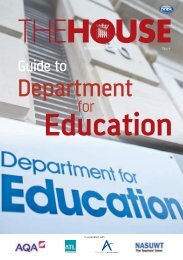Oracy
2fcBkno
2fcBkno
Create successful ePaper yourself
Turn your PDF publications into a flip-book with our unique Google optimized e-Paper software.
<strong>Oracy</strong> framework<br />
School 21 uses the following framework to teach and analyse students’ communication skills.<br />
The <strong>Oracy</strong> Framework isolates the key components of spoken communication, breaking them<br />
into four different areas: linguistic, physical, cognitive and social & emotional.<br />
Physical<br />
Linguistic<br />
Voice<br />
- Fluency & pace of speech<br />
- Tonal variation<br />
- Clarity of pronunciation<br />
- Voice projection<br />
Body language<br />
- Gesture & posture<br />
- Facial expression & eye contact<br />
Content<br />
Cognitive<br />
- Choice of content to convey meaning &<br />
intention<br />
- Building on the views of others<br />
Structure<br />
- Structure & organisation of talk<br />
Clarifying & summarising<br />
- Seeking information & clarification<br />
through questions/ing<br />
- Summarising<br />
Reasoning<br />
- Giving reasons to support views<br />
- Critically examining ideas & views<br />
expressed<br />
Vocabulary<br />
- Appropriate vocabulary choice<br />
Language<br />
- Register<br />
- Grammar<br />
Rhetorical techniques<br />
- Rhetorical techniques such as metaphor,<br />
humour, irony & mimicry<br />
Social & Emotional<br />
Working with others<br />
- Guiding or managing interactions<br />
- Turn-taking<br />
Listening & responding<br />
- Listening actively & responding<br />
appropriately<br />
Confidence in speaking<br />
- Self assurance<br />
- Liveliness & flair<br />
Audience awareness<br />
- Taking account of level of understanding<br />
of the audience<br />
13




